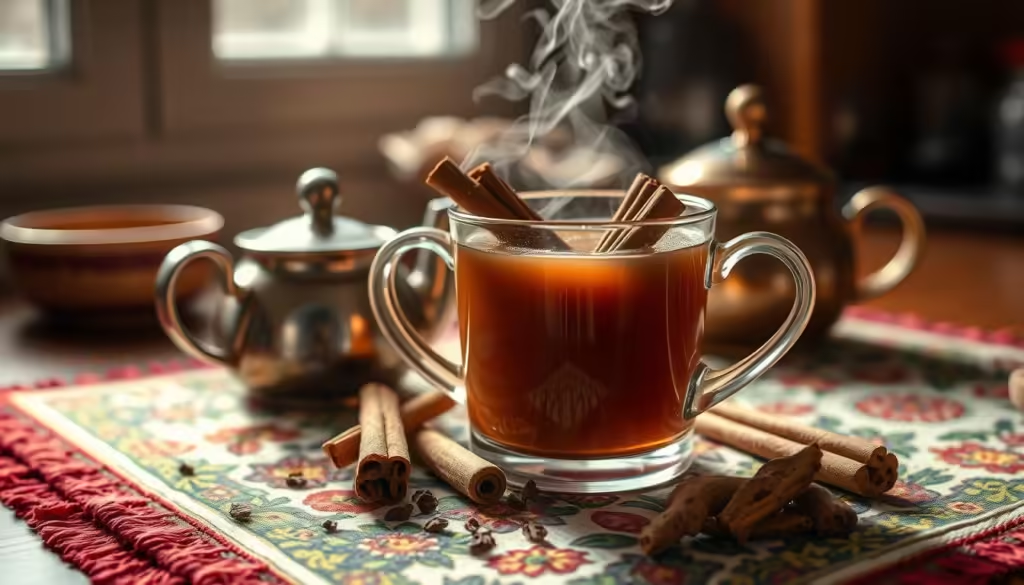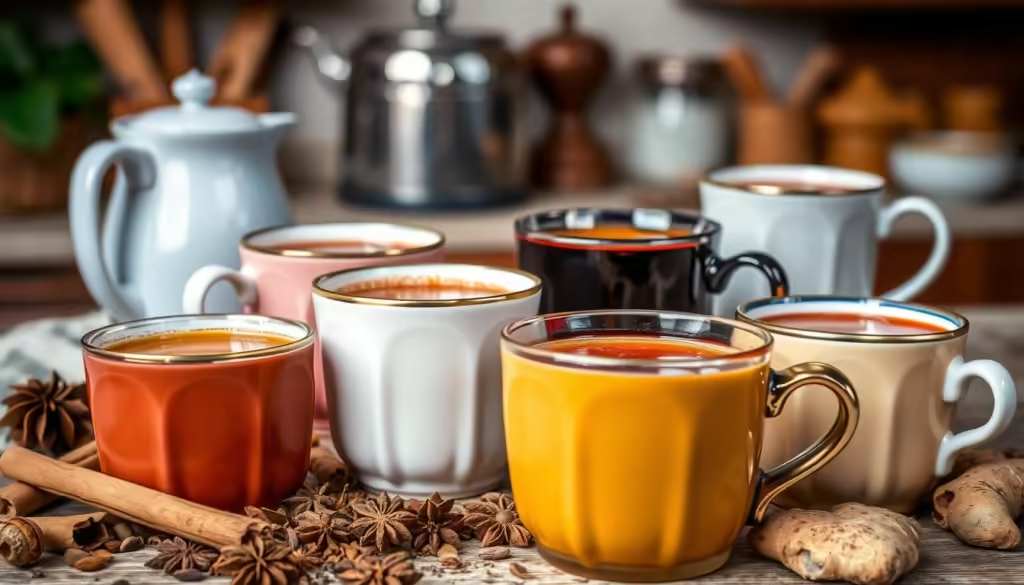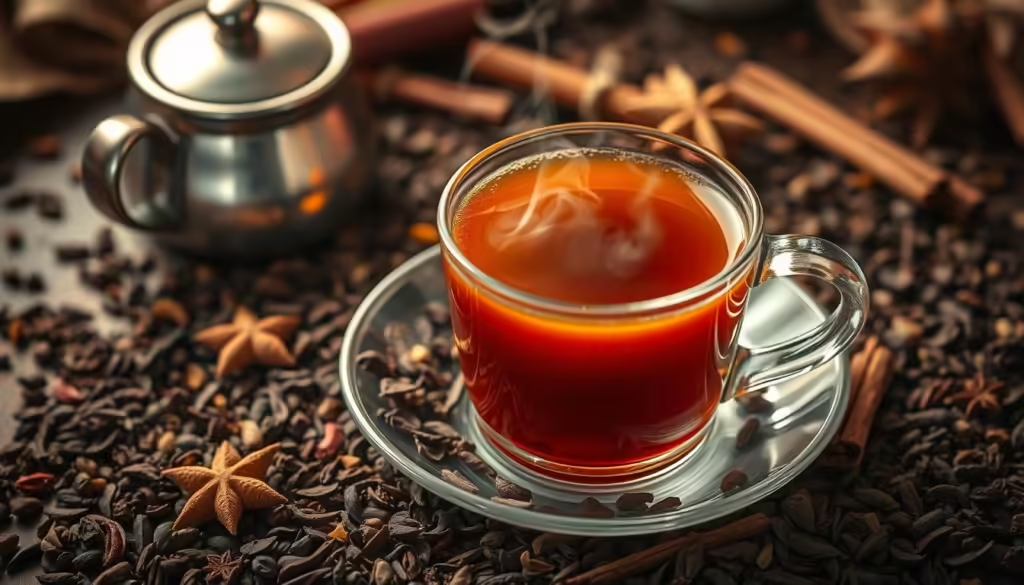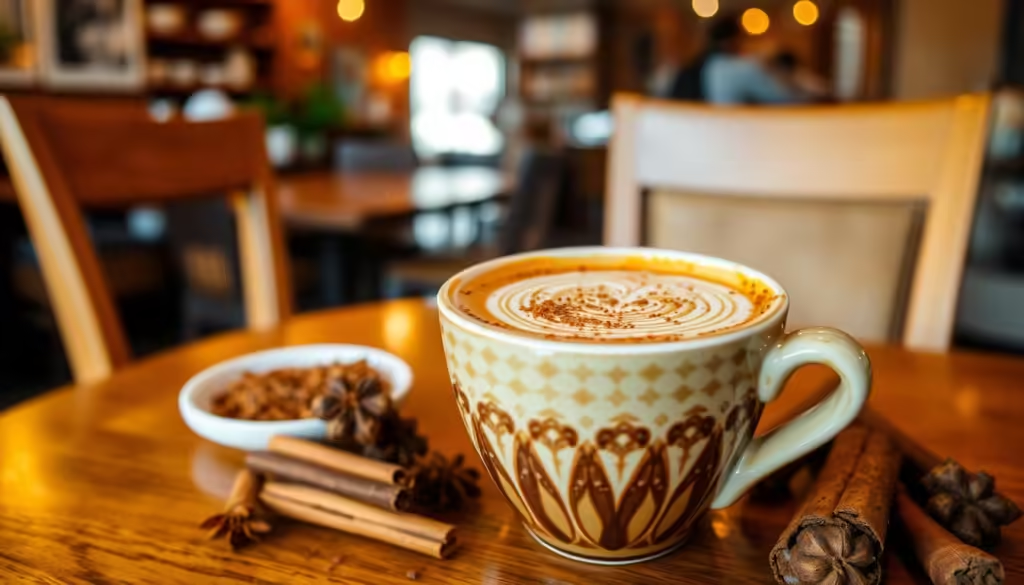Does chai tea have caffeine? Chai is the Indian word for “tea,” featuring black tea combined with spices like cardamom and cinnamon. The American “chai latte” is a sweeter take on this classic drink!
Chai tea has 50-100mg of caffeine in an 8oz serving. This is less than the 120mg in a cup of coffee. But, the caffeine in chai works with tannins to be absorbed slowly. This gives a calm energy boost without the jitters or crashes coffee can cause.

Table of Contents
Key Takeaways
- Chai tea contains 50-100mg of caffeine per 8oz serving
- Caffeine in chai is absorbed more slowly than coffee, providing a calmer energy boost
- Factors like tea type, brewing method, and added ingredients can affect caffeine content
- Chai lattes may have lower caffeine levels than brewed chai tea
- Exploring caffeine-free chai alternatives like herbal teas can be an option
What is Chai Tea?
Chai is a traditional Indian drink made from black tea and spices. The actual “masala chai” mixes strong black tea with steamed milk. But in the U.S., a sweeter version called the “chai latte” is more common. It’s made with powders or syrups, which is different from the traditional way.
Traditional Masala Chai
Masala chai comes from India and is a beloved recipe. It’s made by simmering black tea with spices like cardamom, cinnamon, and ginger. Then, it’s mixed with hot milk, creating a rich, flavorful drink.
Americanized Chai Latte
The chai latte is sweeter and creamier, popular in American coffee shops. It’s made with pre-made chai mixes and steamed milk. This version is more indulgent and easy to find.
| Type of Chai | Caffeine Content |
|---|---|
| Traditional Masala Chai | 50-100 mg per serving |
| Americanized Chai Latte | 25-55 mg per serving |
The caffeine in chai tea changes based on how it’s made. Traditional masala chai has more caffeine than the sweet chai latte in American coffee shops.

“Chai is not just a beverage, it’s a cultural experience that brings people together.”
Caffeine Content in Chai Tea
The caffeine in chai tea can change based on the tea type. Let’s explore the caffeine levels in various chai teas.
Black Chai Tea
Black chai tea usually has the most caffeine, with 50-100 milligrams per 8-ounce serving. This is because it’s made with strong black tea leaves. These leaves naturally have more caffeine than other teas.
Green Chai Tea
Green chai tea has less caffeine, with 30-50 milligrams per serving. The green tea leaves in this chai offer a softer caffeine kick than black chai.
Rooibos Chai Tea
If you want to avoid caffeine, try rooibos chai tea. Rooibos is a caffeine-free herbal tea. So, rooibos chai has no caffeine at all. It’s perfect for those who are caffeine-sensitive or want to limit their caffeine intake.
The caffeine in your chai tea depends on the tea type. You can choose from robust black chai, milder green chai, or caffeine-free rooibos chai. There’s a chai for everyone’s caffeine needs.
| Tea Type | Caffeine Content (per 8oz serving) |
|---|---|
| Black Chai | 50-100 mg |
| Green Chai | 30-50 mg |
| Rooibos Chai | 0 mg |

Keep in mind, the caffeine in chai tea can also change based on the brand and how it’s made. Always check the label or ask your local tea expert. This way, you can find the caffeine level that fits your taste.
does chai tea have caffeine
Chai tea is a favorite among many tea lovers. But, a common question is, does chai tea have caffeine? Yes, chai tea usually has caffeine. The amount can change based on the tea type and how it’s made.
Chai Latte Caffeine Levels
A traditional chai latte made with black tea has about 50-100mg of caffeine. But, chai lattes from powders or syrups might have less, around 25-55mg per serving.
Chai lattes with chai powder have 25-55mg of caffeine per serving. This lets you adjust your caffeine intake. Chai lattes from concentrated syrups have 30-35mg of caffeine per serving, offering a moderate amount.
Herbal chai syrups or powders that don’t use brewed tea are usually caffeine-free. They’re a good option for those who don’t want caffeine.

Knowing the caffeine levels in chai tea and lattes helps you choose what suits your caffeine needs best.
Chai Tea vs. Other Teas
Chai tea is known for its high caffeine content compared to other teas. Oolong tea has 37-55mg, green tea has 35-45mg, and white tea has 15-30mg per serving. Traditional black chai can have up to 100mg of caffeine per cup, making it quite strong.
The high caffeine in chai tea comes from its preparation. Chai is made with black tea leaves that are more oxidized. This makes the tea more robust and rich in caffeine. Green and white teas, on the other hand, are less oxidized, so they have less caffeine.
The caffeine in chai can change based on the blend and brewing method. Some chai recipes include spices, milk, or sweeteners. These can affect the caffeine levels slightly.
| Tea Type | Caffeine Content (per serving) |
|---|---|
| Chai Tea | 40-100mg |
| Oolong Tea | 37-55mg |
| Green Tea | 35-45mg |
| White Tea | 15-30mg |
Whether you love chai or prefer other teas, knowing the caffeine differences helps. It lets you choose what suits your taste and caffeine needs best.
“Chai tea has become more popular than coffee in India, with its unique blend of spices and robust flavor.”
Chai Tea vs. Coffee
Chai tea and coffee have different levels of caffeine and energy boosts. A cup of black chai has 50 to 100 mg of caffeine. Coffee, on the other hand, has about 120 mg per cup. But, how our bodies handle this caffeine is quite different.
Caffeine Absorption
Chai tea’s caffeine is absorbed slowly, unlike coffee’s quick rush. This slow absorption gives a calm, steady energy boost. Unlike coffee’s jitters, chai’s mix of black tea, spices, and herbs is gentler on the body.
Energy Boost Comparison
Chai tea and coffee also differ in how they boost energy. Coffee gives a pure caffeine rush. But chai’s mix of tea and spices like ginger, cardamom, and cinnamon offers a more balanced energy. Many find chai’s energy more focused and relaxed, unlike coffee’s anxious feel.
Choosing between chai tea and coffee depends on what kind of energy boost you want. Chai’s slow caffeine release and mix of ingredients make it a favorite for those seeking calm, balanced energy. On the other hand, Coffee is known for its intense, quick energy.
| Metric | Chai Tea | Coffee |
|---|---|---|
| Caffeine Content (per cup) | 50-100 mg | 120 mg |
| Caffeine Absorption | Gradual, sustained energy | Quick spike, crash |
| Energy Boost | Balanced, calm alertness | Intense, jittery |
Recommended Caffeine Intake
Moderation is key when it comes to caffeine. The FDA says healthy adults should not have more than 400 milligrams a day. But, things like how fast you metabolize caffeine, your health, and if you’re pregnant can change what’s safe for you.
Individual Factors
Pregnant individuals should be careful with caffeine. The American Pregnancy Association says less than 200 milligrams a day is best. This is because caffeine intake during pregnancy might affect the baby.
Listen to how your body reacts to caffeine. Some people are more sensitive and need to drink less. It’s about finding what works for you.
What’s right for you can vary. It’s wise to talk to a doctor to determine your safe amount. They can help based on your health and needs.
“Moderation is key when it comes to caffeine consumption. It’s important to be mindful of your individual needs and sensitivities.”
Health Benefits of Chai Tea
Chai tea is more than just a caffeine boost. It’s packed with spices and herbs that are good for you. Ginger, cardamom, cloves, and cinnamon are antioxidants and can help fight inflammation. Drinking chai tea can be a healthier choice than coffee for many.
Spices and Herbs in Chai
The special mix of spices and herbs in chai tea makes it tasty and healthy. Here are some of the key ingredients and their benefits:
- Cinnamon – Research shows cinnamon can lower bad cholesterol and triglycerides. Even a small amount, 120 mg a day, can be good for your heart.
- Black Tea – Drinking lots of black tea can lower blood pressure. It also reduces heart disease risk by 11% if you drink three cups a day.
- Ginger – Cinnamon and ginger in chai can improve insulin sensitivity and lower blood sugar. Ginger powder can even lower blood sugar by 12% in people with type 2 diabetes.
- Black Pepper – Black pepper in chai tea boosts digestive enzymes for better digestion.
- Milk Proteins – Chai tea with cow’s milk or soy milk can make you feel full. This can help with weight management.
Chai tea is full of antioxidants and has anti-inflammatory properties. It’s also good for your heart, blood sugar, and digestion. So, it’s a very healthy drink to choose.
“Drinking chai tea regularly can provide a range of health benefits, from supporting heart health to aiding in weight management.”
Types of Chai Tea Products
Chai tea comes in many forms, each catering to different tastes and needs. You can choose from loose leaf teas to pre-packaged options. This variety makes it easy for everyone to enjoy this beloved drink.
Loose Leaf Chai Tea
For those who love brewing their chai, loose-leaf teas are the best. Brands like The Chai Box offer sizes from 2.5 ounces to 1 pound. This lets you make your perfect cup. Vahdam Teas and Kolkata Chai Co. also have loose-leaf options for an an authentic and aromatic taste.
Chai Tea Bags
Chai tea bags are easy to use and still high in quality. Republic of Tea’s bold green chai is in a 36-count pack for a quick caffeine fix. MEM Tea Imports has a caffeine-free herbal chai in loose leaf form for a soothing drink.
Chai Tea Concentrates
Concentrates make making chai easy. Oregon Chai has 32-ounce cartons ready to use. One Stripe Chai Co. sells unsweetened masala chai concentrate in glass bottles of 8, 16, or 32 ounces.
Chai Tea Powders
Powdered chai mixes are super convenient. David Rio’s dirty chai mix is a 14-ounce powder. Blue Lotus Chai’s masala chai mix comes in 0.5, 3, and 16-ounce sizes.
Whether you prefer loose leaf, bags, concentrates, or powders, there’s a chai tea for you. The variety lets you explore the rich flavors and aromas of chai. Whether you want a traditional experience or something quick and easy, there’s a chai tea product for every taste and lifestyle.
| Brand | Product | Size | Type |
|---|---|---|---|
| The Chai Box | Loose Leaf Chai Concentrate | 2.5 oz to 1 lb | Loose Leaf |
| Oregon Chai | Chai Tea Concentrate | 32 oz | Concentrate |
| Vahdam Teas | Kashmiri Kahwa Loose Leaf Tea | 3.5 oz | Loose Leaf |
| Kolkata Chai Co. | Rose Chai Kit | 4.2 oz | Loose Leaf |
| David Rio | Dirty Chai Mix | 14 oz | Powder |
| MEM Tea Imports | Masala Chai | 20-count tin, 100-count bag, 2/4/16 oz loose | Bags, Loose Leaf |
| Rishi Tea | Spicy Masala Chai | 1 lb bag | Loose Leaf |
| Blue Lotus Chai | Masala Chai Mix | 0.5, 3, 16 oz | Powder |
| One Stripe Chai Co. | Unsweetened Masala Chai Concentrate | 8, 16, 32 oz | Concentrate |
| Republic of Tea | Bold Green Chai Tea | 36-count | Bags |
| MEM Tea Imports | Caffeine-Free Herbal Chai | 2, 4, 16 oz | Loose Leaf |
| Samovar Tea | Pumpkin Chai | 1 lb | Loose Leaf |
| Rishi Tea | Chocolate Chai | 4 oz, 1 lb | Loose Leaf |
Chai tea has a long history, dating back over 5,000 years to ancient India. The traditional spices in chai, like ginger and cinnamon, are still used today for their health benefits. Chai recipes vary by region, offering a wide range of flavors and spices.
“Chai typically consists of tea (such as Assam or Darjeeling black tea), sweeteners (like white sugar, brown sugar, honey, or jaggery), milk (traditional buffalo milk or cow’s milk, and dairy alternatives), and spices (commonly cardamom, ginger, cloves, cinnamon, and black peppercorns).”
Whether you like loose leaf, bags, concentrates, or powders, there’s a chai tea for you. The variety lets you explore the rich flavors and aromas of chai. Find your perfect chai experience among the many options available.
Conclusion
Chai tea does contain caffeine, especially the black tea version. It has 50-100mg per 8oz serving. But, the caffeine in chai is absorbed slowly, giving a calm energy boost without jitters or crashes.
Chai also has health benefits from its spices and herbs. If you want to reduce coffee intake or try something new, chai is a great choice.
The caffeine in chai can change based on the tea type, brewing method, and spice mix. It usually has less caffeine than coffee. If you’re sensitive to caffeine, drink chai in moderation.
There are caffeine-free rooibos chai or herbal chai options for those who can’t handle caffeine. These are good alternatives.
Chai tea is a tasty way to enjoy tea, spices, and herbs. It has a rich history and cultural importance. Adding chai to your daily routine can be both flavorful and healthy.
Knowing about chai’s caffeine content helps you enjoy it as part of a balanced lifestyle. You can customize your chai experience to suit your taste and needs.
FAQ
Q: Does chai tea have caffeine?
A: Yes, chai tea has caffeine, about 50-100mg per 8oz serving. The exact amount depends on the tea type.
Q: What is chai tea?
A: Chai means “tea” in Indian. Traditional masala chai mixes black tea with spices like cardamom and cinnamon. The American version, a “chai latte,” is sweeter.
Q: How much caffeine is in chai tea?
A: Black chai tea has 50-100mg of caffeine per 8oz. Green chai has less, 30-50mg. Rooibos chai has no caffeine.
Q: How much caffeine is in a chai latte?
A: Chai lattes made with powders or syrups have 25-55mg of caffeine. A traditional steeped chai latte has 50-100mg, like regular chai.
Q: How does the caffeine in chai tea compare to other teas and coffee?
A: Chai has more caffeine than most teas but less than coffee. Oolong tea has 37-55mg, green tea 35-45mg, and white tea 15-30mg. Black chai has about 50-100mg, less than coffee’s 120mg.
Q: How does the caffeine in chai tea affect energy levels differently than coffee?
A: Chai’s caffeine is absorbed slowly, giving a gradual energy boost. This is different from coffee’s quick energy spike and crash.
Q: What is the recommended daily caffeine intake?
A: The FDA says 400mg of caffeine daily is safe for most. But, factors like metabolism and pregnancy can change this. Pregnant women should limit caffeine to 200mg daily.
Q: What are the health benefits of chai tea?
A: Chai tea boosts energy moderately and offers health benefits. Spices like ginger and cinnamon have antioxidants and anti-inflammatory properties.
Q: What types of chai tea products are available?
A: You can find chai tea in loose leaf, tea bags, powdered mixes, and concentrates. Loose leaf and tea bags let you control brewing. Concentrates and powders are convenient.
